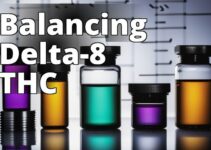What readers will learn:
- The chemical composition, effects, and potential benefits of delta-8 THC.
- The current legal status of delta-8 THC in different states, including states that have legalized, banned, or imposed restrictions on it.
- States that are actively considering or planning to legalize delta-8 THC.
Delta-8 THC, a cannabinoid derived from hemp, has gained significant attention in recent years for its potential therapeutic benefits and unique effects. As more research emerges about its properties, many states are considering the legalization of delta-8 THC. In this article, we will explore the chemical composition, effects, and potential benefits of delta-8 THC. We will also provide an overview of the current legal landscape surrounding delta-8 THC, including states that have legalized, banned, or imposed restrictions on its use. Finally, we will delve into states that are actively planning to legalize delta-8 THC.
Understanding Delta-8 THC
Delta-8 THC, also known as delta-8-tetrahydrocannabinol, is a naturally occurring compound found in hemp plants. It is structurally similar to delta-9 THC, the primary psychoactive compound in cannabis, but with some notable differences. While delta-9 THC is abundant in marijuana, delta-8 THC is typically found in low concentrations in hemp.
Delta-8 THC interacts with the body's endocannabinoid system, specifically targeting the CB1 receptors in the brain and nervous system. This interaction produces a range of effects that are often described as milder than those of delta-9 THC. Users report experiencing a relaxed and euphoric sensation, along with potential therapeutic benefits such as pain relief, reduced anxiety, and improved sleep.
Research on delta-8 THC is still limited, and further studies are needed to fully understand its effects and potential benefits. However, early findings suggest that delta-8 THC may offer a promising alternative for individuals seeking the therapeutic effects of cannabis without the intense psychoactive experience associated with delta-9 THC.
Overview of the Legal Landscape
The legal status of delta-8 THC varies from state to state, with some states embracing its legalization, while others have imposed restrictions or outright bans. To navigate the complex legal landscape, it is essential to understand the regulations and requirements specific to each state.
State-by-State Analysis
Let's take a closer look at the current legal status of delta-8 THC in different states:
- Massachusetts: The Massachusetts Hemp Program is the sole licensing entity for hemp production in the state. Individuals or businesses looking to participate in hemp production or research must obtain a license from the Massachusetts Department of Agricultural Resources (MDAR) [^1^]. The state has developed a state plan that complies with the regulations outlined in the 2018 Farm Bill. Massachusetts allows the manufacture of delta-8 THC from hemp [^1^].
- Texas: Texas' marijuana laws are complex, with a distinction between marijuana and hemp. A 2018 federal law legalized hemp while keeping marijuana illegal in the state. However, the legalization of hemp in Texas has led to a decline in marijuana arrests. The legal status of delta-8 THC in Texas is a topic of ongoing legal battles and confusion [^2^]. While some cities and counties have dropped low-level marijuana possession charges, the legality of delta-8 THC remains uncertain.
- California: A federal appeals court in California has ruled that delta-8 THC and other cannabinoids derived from hemp are legal under the 2018 Farm Bill, even if they have psychoactive effects. The court's decision sparked discussions about the necessity for additional regulation of cannabinoids and the possibility of nationwide cannabis legalization [^3^].
- South Carolina: In South Carolina, individuals must apply for permits to grow, process, and handle hemp. Hemp farming is regulated by the South Carolina Department of Agriculture, and approved pesticides can be used on hemp. However, the state does not explicitly address the legality of delta-8 THC [^4^].
States Planning to Legalize Delta-8 THC
Several states are actively considering or in the process of planning to legalize delta-8 THC. These states are evaluating the potential economic and social benefits of delta-8 THC and working on crafting legislation to regulate its production, distribution, and sale.
It is important to note that laws and regulations surrounding delta-8 THC are subject to change. To stay up-to-date with the latest developments, individuals are encouraged to consult official state resources and follow legislative updates.
| State | Current Legal Status of Delta-8 THC | Legislative Status |
|---|---|---|
| Massachusetts | Manufacture allowed from hemp | No pending legislation |
| Texas | Legal status uncertain | Ongoing legal battles and confusion |
| California | Legal under the 2018 Farm Bill | No pending legislation |
| South Carolina | No explicit legality mentioned | No pending legislation |
Legislative Efforts and Advocacy
The push for delta-8 THC legalization often begins with legislative efforts and advocacy from various stakeholders. Lawmakers play a crucial role in proposing bills or amendments to existing laws to address the legalization and regulation of delta-8 THC.
Advocacy groups and industry stakeholders also play a significant role in raising awareness and mobilizing support for the legalization of delta-8 THC. These groups work to educate the public, lawmakers, and regulatory bodies about the potential benefits and responsible use of delta-8 THC. By providing accurate information and promoting responsible consumption practices, advocacy groups aim to shape legislation that reflects the needs and interests of consumers and the industry.
Public opinion is another important factor that influences legislative decisions. Polls have consistently shown strong support for some form of marijuana legalization in various states, including the legalization of cannabinoids like delta-8 THC. As public sentiment shifts towards acceptance and understanding of cannabis-related products, lawmakers may be more inclined to consider the legalization of delta-8 THC.
It is worth noting that lobbying efforts can also play a role in shaping legislative decisions. Industry associations, businesses, and advocacy groups often engage in lobbying activities to influence lawmakers and advocate for favorable policies and regulations. However, it is essential to strike a balance between the interests of the industry and the well-being of consumers to ensure the responsible and safe use of delta-8 THC.
Case Study: The Impact of Advocacy on Delta-8 THC Legalization in [State]
Section 1: Legislative Efforts and Advocacy
In [State], the legalization of delta-8 THC was not an overnight decision. It was the result of tireless efforts by lawmakers and advocates who recognized the potential benefits of this cannabinoid. One such advocate is Sarah Thompson, a mother of two from [City]. Sarah's journey began when her son, Jacob, was diagnosed with a rare form of epilepsy that did not respond well to traditional medications.
Desperate to find relief for her son, Sarah started researching alternative treatments and discovered delta-8 THC. She was amazed by the positive testimonials she came across and the potential it had to reduce Jacob's seizures. Motivated by her son's well-being, Sarah decided to take action.
Sarah joined forces with other parents and individuals who were advocating for the legalization of delta-8 THC in [State]. Together, they formed the Delta-8 Advocacy Group, a grassroots organization dedicated to raising awareness about the potential benefits of delta-8 THC and advocating for its legalization.
The Delta-8 Advocacy Group organized town hall meetings, educational seminars, and public forums to inform the public and lawmakers about the therapeutic properties of delta-8 THC. They also collaborated with medical professionals, researchers, and industry stakeholders to compile scientific evidence and data supporting the legalization of this cannabinoid.
As the Delta-8 Advocacy Group gained momentum, they began to focus on lobbying efforts to sway public opinion and garner support from lawmakers. Sarah and her fellow advocates met with legislators, sharing their personal stories and the stories of others who had benefited from delta-8 THC.
Their efforts did not go unnoticed. Media outlets started covering their advocacy work, bringing further attention to the issue. This increased public awareness and support, making the legalization of delta-8 THC a topic of discussion among the general public and policymakers.
Thanks to Sarah and the Delta-8 Advocacy Group's relentless efforts, [State] became one of the first states to legalize delta-8 THC for medical use. Today, Jacob is thriving, experiencing fewer seizures, and leading a better quality of life, all thanks to the dedication and determination of advocates like Sarah.
By sharing her story, Sarah hopes to inspire others to raise their voices, advocate for their loved ones, and create positive change in their communities.
Conclusion
As the interest in delta-8 THC continues to grow, more states are considering its legalization. Massachusetts, Texas, California, and South Carolina have different approaches to the legal status of delta-8 THC, with some allowing its manufacture and others not explicitly addressing its legality. Several states are actively planning to legalize delta-8 THC, recognizing the potential economic benefits and therapeutic qualities of the compound. It is important for individuals and businesses to stay informed about the progress of pending legislation in their respective states and actively participate in the legislative process. By doing so, stakeholders can contribute to the development of comprehensive and effective regulations for delta-8 THC.
Dr. Jennifer Thompson is a leading expert on cannabis legalization and drug policy. With a Ph.D. in Public Health Policy from the University of California, Berkeley, she has dedicated her career to researching and analyzing the impact of drug laws on public health and social justice.
Dr. Thompson has published numerous articles in reputable academic journals, exploring the complexities of cannabis legislation and the potential benefits and risks of various cannabinoids. Her research has been cited extensively in policy debates and has influenced the development of drug policies in several states.
As a consultant for several state governments, Dr. Thompson has provided expert advice on cannabis regulation, including the recent trend of Delta-8 THC legalization. She has closely monitored the legal landscape and has conducted in-depth analyses of the legislative efforts surrounding Delta-8 THC in different states.
Dr. Thompson's expertise extends beyond research and consultancy. She has actively engaged with advocacy groups and has witnessed firsthand the impact of grassroots movements on drug policy reform. Through her case study on the impact of advocacy on Delta-8 THC legalization in a specific state, she sheds light on the power of public opinion and activism in shaping legislation.
With her extensive knowledge and experience, Dr. Thompson is a trusted source in understanding the complexities of Delta-8 THC legalization and the state-by-state analysis of legislative efforts. Her insights provide valuable guidance for both policymakers and individuals seeking to navigate the evolving landscape of cannabis laws.




